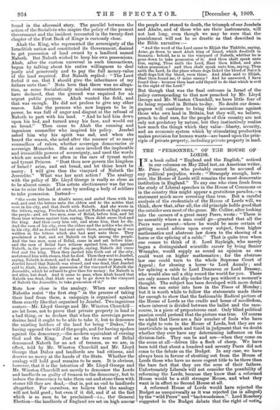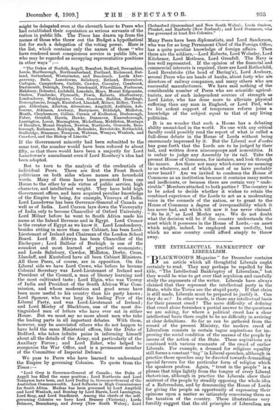THE " PERSONNEL " OF TUE HOUSE OF • LORDS.
IN a book called " England and the English," noticed in our columns on May 22nd last, an American writer, Mr. Price Collier, who probably cannot be accused of any political prejudice, wrote : " Strangely enough, how- ever, the House of Lords still remains the most democratic institution in England." To any one who rises fresh from the study of Liberal speeches in the House of Commons or in the country this might appear a gratuitous paradox,—a statement much more arresting than true. But a careful analysis of the credentials of the House of Lords"will, we think, show that, after all, the old principle holds good that the outsider sees most of the game. Mr. Collier, after looking into the careers of a great many Peers, *rote : " There is no assembly where a man could go—granted that all the Peers were present—where he would be more certain of getting sound advice upon every subject, from higher mathematics and abstruse law down to the shoeing of a horse or the splicing of a cable." That is quite true when one comes to think of it. Lord Rayleigh, who merely began a distinguished scientific career by being 'Senior Wrangler, would supply as sound. an opinion as one could want on higher mathematics ; for the abstruse law one could turn to the whole Supreme Court of Appeal ; for shoeing a horse • to Lord Annaly ; and for splicing a cable to Lord Dunraven or Lord Brassey, who would also sail a ship round the world for you. These are only names that slip under the pen without a moment's thought. The subject has been developed with more detail than we can enter into here in the Times of Monday ; but it is worth while to follow the statements made there far enough to show that the fashionable Radical picture of the House of Lords as the cradle and home of noodledom, where interest is divided between the ballet and the race- course, is a piece of preposterous cant. Only blind political passion could pretend that the picture was true. Of course we admit that there are a fair number of fools who have the right to vote in the House of Lords, but they are so inarticulate in speech and timid in judgment that we doubt whether they ever have any determining influence on the division-lists. They can be and are—when they come on the scene at all—driven like a flock of sheep. We have been told that about a hundred. and seventy Peers did not come to the debate on the Budget. In any case, we have always been in favour of shutting out from the House of Lords those who have no more cogent title to be there than the bare fact that they are the sons of their fathers. Unfortunately Liberals will not consider the possibility of reforming the Lords, because they know that a reformed House would be a still stronger House, and what they want is in effect no Second House at all.
A reformed House of Lords would have rejected the Budget as unequivocally as it was rejected (as is alleged) by the "wild Peers"-and. "backwoodsmen.". Lord Rosebery suggested in the Budget debate that the right of vain, might be delegated even at the eleventh hour to Peers who had established their reputation as serious servants of the nation in public life. The Times has drawn up from the names of those who threw out the Budget a hypothetical list for such a delegation of the voting power. Here is the list, which contains only the names of those "who have rendered most conspicuous service in public life, or who may be regarded as occupying representative positions in other ways " .- "The Dukes of Norfolk, Argyll, Beaufort, Bedford, Devonshire, Leeds, Marlborough, Northumberland, Portland, Richmond, Rut- land, Sutherland, Westminster, and Buccleuch. Lords Aber- gavenny, Bath, Lansdowne, Salisbury, Zetland, Brownlow, Cadogan, Camperdown, Carlisle, Cawdor, Coventry, Cranbrook, Dartmouth, Denbigh, Derby, Dundonald, Fitzwillia,m, Fortescue, Halsbury, Echester, Lichfield, Lonsdale, Mayo, Mount Edgcumbe, Onslow, Pembroke, Plymouth, Powis, Roberts, Shaftesbury, Londonderry, Waldegrave, Cross, Goschen Halifax, Hardinge, Donoughmore, Iveagh, Knutsford, Llandaff, kilner, Ridley, Trede- gar, Mdenham, Allerton, Alverstone, Ampthill, Ardilaun, Ash- bourne, Atkinson, Avebury, Barrymore, Biddulph, Midleton, Meath, Cheylesmore, Collins, Curzon of Kedleston, Desborough, Faber, Grenfell, Harris, Hawke, Dunraven, Knaresborough, Lamington, Lovat, Macnaghten, Michelham, Middleton, Montagu of Beaulieu Mount Stephen, Newton Northcote, Ormonde, Bess- borough, Rathmore, Rayleigh, Redesdale, Revelstoke, Rothschild, Stalkidge, Stanmore, Tennyson, Waleran, Wemyss, Wenlock, and Crawford, and the Bishop of Lincoln."
If the Government minority had been submitted. to the same test, the number would have been reduced to about fifty, so that there would have been a majority for Lord Lansdowne's amendment even if Lord Rosebery's idea had been adopted.
But to turn to the analysis of the credentials of individual Peers. There are first the Front Bench politicians on both sides whose names are household words. Many of these have been promoted from one House to the other by sole virtue of public service, high character, and intellectual weight. They have held high Government offices, and have acquired peculiar lmowledge of the Empire by being, for example, Viceroys of India. Lord Lansdowne has been Governor-General of Canada as well as of India. Lord Curzon lays down the Viceroyalty of India only to become Chancellor of Oxford University. Lord Milner before he went to South Africa made his name at the Inland Revenue and in Egypt. Lord. Cromer is the creator of Egypt as we know it. Lord Londonderry, besides sitting in more than one Cabinet, has been Lord- Limitenant of Ireland and Chairman of the London School Board. Lord. St. Aldwyn has been Chancellor of the Exchequer ; Lord Balfour of Burleigh is one of the soundest and most learned. of practical economists ; and Lords Salisbury, Cawdor, Midleton, Derby, Cross, Llandaff, and Knutsford have all been Cabinet Ministers. All these Peers, of course, are in opposition. On the Liberal side we have Lord Crewe, who before he became Colonial Secretary was Lord-Lieutenant of Ireland and President of the Council, a, man of literary learning and the most cultivated. taste ; Lord Elgin, who was Viceroy of India and President of the South African War Com- mission, and whose moderation and good sense have been more useful to his country than his party knows ; Lord Spencer, who was long the leading Peer of the Liberal Party, and was Lord-Lieutenant of Ireland ; and Lord Morley of Blackburn, one of the most dis- tinguished men of letters who have ever sat in either House. But we must say no more about men who take the leading parts in all important debates. With them, however, may be associated. others who do not happen to have held. the same Ministerial offices, like the Duke of Bedford, who takes infinite, pains in informing himself about all the details of the Army, and particularly of. the Auxiliary Forces ; and Lord. Esher, who helped to reorganise the War Office, and is a permanent member of the Committee of Imperial Defence.
We pass to Peers who have learned to understand the Empire by governing Colonies. To quote from the Times;— "Lord Grey is Governor-General of Canada ; the Duke of Argyll has filled the same position ; Lord Northcote and Lord Tennyson have been, and Lord Dudley is, Governor-General of the Australian Commonwealth. Lord Selborne is High Commissioner for South Africa. Madras has been governed by Lord Ampthill and Lord-Wenlock, and Bombay by Lord Harris, Lord Lamington, Lord Reay, and Lord Sandhurst. Among the chiefs of the self- governing -Colonies we have Lord Brassey (Victoria) ; Lords Belmore, Beauchamp, and Jersey (New South Wales) ; Lord
Chelmsford (Queensland and New South Wales) ; Lords Onslow, Plunket, and Ranfurly (New Zealand) ; and Lord Stanmore, who has governed at least five Colonies."
Many Peers have been diplomatists, and Lord. Sanderson, who was for so long Permanent Chief of the Foreign Office, has a quite peculiar knowledge of foreign affairs. Then there are the soldiers,—Lord Roberts, Lord Wolseley, Lord Kitchener, Lord Methuen, Lord Grenfell. The Navy is less well represented. If the opinion of the financial and commercial interests is required, there are Lord Rothschild, Lord. ..Revelstoke (the head. of Baring's), Lord Avebury, several Peers who are heads of banks, about forty who are directors of railway companies, and many others who are successful manufacturers. .We have said nothing of the considerable number of Peers who are scientific agricul- turists, nor of such independent sources of strength as Lord Lister, who has done more to alleviate physical suffering than any man in England, or Lord Peel, who to his ardent support of temperance reform joins a knowledge of the subject equal to that of any living politician.
It is no wonder that such a House has a debating ability unmatched in the world. No one with any critical faculty could. possibly read the report of what is called a full-dress debate in the House of Lords without being enormously impressed by it. But the Liberal mot d'ordre has gone forth that the Lords are to be judged by their tail, and written down nincompoops and nonentities. It is unfair to judge any Assembly by its tail. Take the present House of Commons, for instance, and look through the names. Are there not many which convey no meaning to us whatever, and of which most of us have probably never heard ? Are we invited to condemn the House of Commons as an institution because it contains many mutes and inefficients, or because there are certain very " unde- sirable " Members attached to both parties ? The country is to be asked to decide whether it wishes to retain the combined experience of the Lords to act as a moderating voice in the counsels of the nation, or to grant to the House of Commons a degree of irresponsibility which it has never had, and which till now it has never claimed. " So be it," as Lord Morley says. We do not doubt what the decision will be if the country understands the asset which it possesses in the House of Lords,—an asset which might, indeed, be employed more usefully, but which no sane country could afford. simply to throw away.







































































 Previous page
Previous page